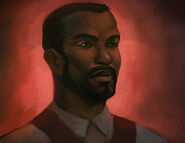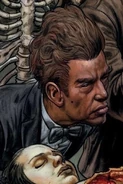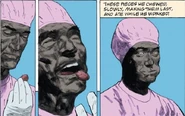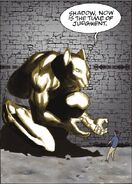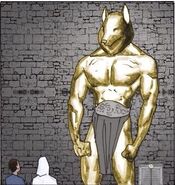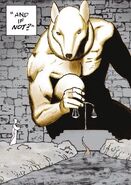| “ | Back in my day, we had it all set up. You line up when you die, and you answer for your evil deeds and for your good deeds, and if your evil deeds outweighed a feather, we'd feed your soul and your heart to Ammet, the Eater of Souls. | ” |
–Mr. Jacquel to Shadow, Chapter Eight | ||
Mr. Jacquel is one of the Old Gods and a supporting character in American Gods. He runs Ibis and Jacquel Funeral Parlor with his partner, Mr. Ibis.
Significance in narrative[]
Chapter Seven[]
When Shadow first arrives in Cairo, IL, he meets a cat (Bast), a talking dog (Mr. Jacquel), and a man in gold-rimmed spectacles (Mr. Ibis) who take him to Ibis and Jacquel family funeral parlor.
Shadow watches Mr. Jacquel as he performs an autopsy on a murdered young girl. He does it professionally and slowly, but eats small pieces of her heart, liver, and kidney as he is performing the procedure.
Chapter Eight[]
Later, Shadow and Jacquel go to the house of an elderly deceased woman named Lila Goodchild. Her husband is poor and upset and he complains that their children have shown no respect for their parents. Meanwhile, Shadow takes away the body and learns how to work the hearse and the gurney. On the way back, Shadow asks Jacquel if he believes in souls. Jacquel explains that in his day, they would feed those whose evil deeds outweigh a feather to the Ammed, the Eater of Souls, however, the feather was a very heavy custom-made feather. Jacquel calls Jesus a "lucky son of a virgin," but mentions that a friend of his saw him hitchhiking in Afghanistan, so it all depends on where you are. Jacquel also reveals that Christmas isn't actually his birthday, but the birthday of Mithras. He complains about the fate of various gods, including Horus and Bast, and contemplates his own decrepit future.
Ibis and Jacquel host a service for Lila Goodchild and they ask Shadow to pick up a body the police phoned about. When he arrives at the site, he sees Mad Sweeney frozen with a twenty-dollar bottle of whiskey in his lap. Back at the funeral home, Mr. Goodchild continues to complain how his children won’t come to pay their respects, repeating “the apple doesn’t fall far from the tree”.
That night, Shadow, Ibis, and Jacquel set an extra place on the table and pour everyone expensive Irish whisky. Ibis tells Mad Sweeney's story: he was made to protect a precious stone in Ireland, and was brought to America by a young Irish girl looking for a place to make money. They all get drunk to the point that Sweeney starts adding to the conversation and Sweeney reminds Shadow how to do the coin trick: you take the coin out of nowhere, out of the hoard, and out of your mind.
Chapter Sixteen[]
As Shadow journeys through the Underworld, Mr. Ibis escorts him to Anubis to be dissected and judged, leaving Shadow feeling painfully exposed as all of his sins are examined. Anubis asks for Shadow's heart and Bast passes it to Ibis. If Shadow's heart is too heavy, it will be fed to Ammet, the Eater of Souls. Anubis brings out a pair of golden scales and places a feather on one side and Shadow's heart on the other as Ammet lurks in the shadows, waiting. The scale balances out and Shadow is allowed to choose where to go next. Shadow asks for no heaven or hell but to simply rest and let it end. Mr. Jacquel opens a door to Nothing for Shadow and he walks through joyously.
Physical appearance[]
Mr. Jacquel first appears as a long-muzzled, black dog with high, pointed ears. In his human form, he is described as having darker skin than Mr. Ibis and is "a very tall dark-skinned man."
Gallery[]
Black Phoenix Alchemy Lab
Graphic novel
Cultural Background[]
Mr. Jaquel is American Gods ' version of the god Anubis. Anubis was one of the main and more popular gods of the Egyptian mythology, as well as a divinity associated with death and the afterlife.
His birth is quite unclear: some versions claim he was the son of Osiris, lord of the underworld, and thus associate him with the figure of Horus. Other think he was the son of Bast, the cat-goddess. The most popular and well known version of the myth describes Anubis as the illegitimate son of Osiris and his sister-in-law Nephtys, the wife of Seth. Nephtys, trying to protect her son from her husband's wrath, hid Anubis in a swamp where he was later found by Isis who, being childless at the time, decided to raise him as her own to become her faithful guardian and companion. [1]
Later, when Osiris was murdered and mutilated by his brother Seth, Anubis put back together the pieces of his corpse to allow him to be resurrected by Isis and Nephtys, creating in the process the first mummy. This myth explains why Anubis is the god of the embalmers, nicknamed "he of the bandages". The processus of mummification practiced by the Egyptians on their dead, believed to be the key to eternal life, was merely a repetition and an imitation of Anubis' work on Osiris' corpse. In fact, the ones to practice this mummification were the priests of Anubis, wearing a costume representing their god to do their work.
Anubis was said to be the protector of the dead. As the "lord of the necropolis", he protected the tumbs and the "city of the dead". He also welcomed the recently deceased at the door of the Amenti, the underworld, and protected them from all dangers and harms until they reached the palace of Osiris, lord of the afterlife.
Once before Osiris, the defuncts are judged and put on trial for the sins of their life. Their heart is taken and weighed on a scale against a Maât (the embodiment of truth, good and virtue, usually represented as a feather). If their heart weighs more than the Maât, they'll be condemned to destruction, their essence devoured by a dreadful monster. If not, then they'll have access to a peaceful afterlife. Opinions disagree on Anubis role in the trial: some say he is the one responible for weighing the heart of the dead and the mediator between the judged deceased and the judge-gods [2], while others think he had no role in the trial and merely acted as the guardian and guide of the soul from the door of the Amenti to Osiris' courthouse. [3]
If a dead also desired to go back to the world of the living, they needed to inform Anubis of their project and ask him for his authorization, because only a decree of Anubis could allow such a thing to happen.
"Anubis" isn't the actual deity's name. Despite being know as such today, "Anubis" is the name the Greek gave to this psychopomp, who was known in Egypt as "Inpou" (a word meaning "young dog" or "young being"). [4] The god is usually represented as a black canine, or a man with a black canine head. While in popular culture this animal is considered a jackal, in truth it seems it was rather a representation of a type of wild, feral dog close to wolves and jackals (or, according to more modern researches, of an Egyptian wolf). The black coloration of Anubis was a reference to the tar used in the mummification process [5]. Wolves and wild dogs were often found in the desertic surroundings of the necropolis, feeding of the carrions, thus the Egyptians turned them into divinities protecting the dead. There were many of those canine death gods, such as Oupouaout in Assiout or Khentamentiou in Abydos, but they all stayed minor and local gods, overshadowed and then assimilated by the very popular Anubis, who was worshipped in all the main religious centers of Egypt, from Thebes to Memphis. Numerous clues seem to indicate that Anubis used to be the god of the Egyptian afterlife and the ruler of the dead before the rise in popularity of Osiris in the Middle Kingdom, such as representations of him with the sekhem scepter, or the flagellum, a symbol of authority. Due to being the one tasked with opening the gates of the Underworld, he was also often seen with a key (in his hand in humanoid form, around his neck in canine shape). [6]. When it became a common practice to associate each god with a wife and a child to create a divine trinity, Anubis was considered to be the husband of the goddess Anput, a female counterpart of Anubis, and the serpent-goddess Kebechet, embodiment of the embalming liquid.
His main sanctuary (and probably where his worship started) was in the city of Assiout, later renamed by the Greeks Cynopolis, "the city of dogs". During the Ptolemaic period, during which Egypt became an Hellenistic kingdom, Anubis was associated with the Greek psychopomp god Hermes, becoming the god Hermanubis. He was also associated with other Greek concepts such as the Sirius star, the Hades and Cerberus.
Anubis regained a fame through popular culture, being misidentified as a sinister and evil god of death in medias such as video games, television series, movies or cartoons. [7].
Notes and trivia[]
- Black Phoenix Alchemy Lab created a perfume oil based on Mr. Jacquel for their line "American Gods". It is described as: Golden amber, hyssop, North African patchouli, and embalming spices.
References[]
- ↑ The Egyptian Mythology, by Aude Gros de Beler
- ↑ The Egyptian Mythology, by Aude Gros de Beler
- ↑ Gods of Egypt, by Sylvie Albou-Tabart
- ↑ Gods of Egypt, by Sylvie Albou-Tabart
- ↑ "Atlas of Mythology" Encyclopedia, directed by Eric Mathivet
- ↑ "Atlas of Mythology" Encyclopedia, direct by Eric Mathivet
- ↑ https://en.wikipedia.org/wiki/Anubis

